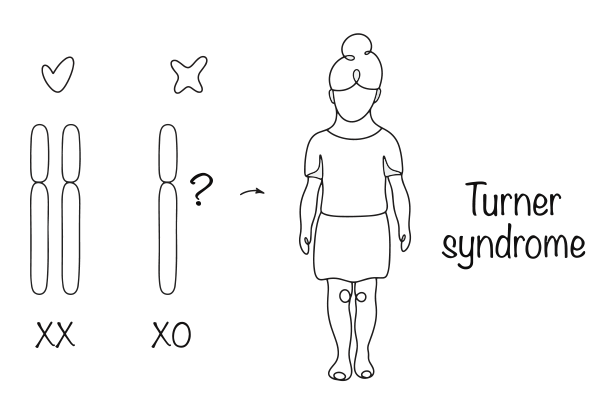
Turner Syndrome is a rare genetic condition that affects girls and women, influencing growth, physical development, and reproductive health. While the condition may seem overwhelming, a timely diagnosis and appropriate medical care can help individuals lead healthy and fulfilling lives. At Manipal Hospitals Pune, our specialists in Obstetrics & Gynaecology provide personalised care and advanced treatment options for Turner Syndrome, ensuring comprehensive support for patients and families.
Synopsis
What Causes Turner Syndrome?
Turner Syndrome occurs when one of the two X chromosomes in females is missing or partially missing. Normally, females have two X chromosomes (XX), but in Turner Syndrome, one is absent or incomplete, leading to certain developmental differences.
-
Chromosome deletion—complete absence of one X chromosome.
-
Partial deletion – only a portion of the X chromosome is missing.
-
Mosaic Turner Syndrome – some cells have two X chromosomes, while others have only one.
These chromosomal abnormalities usually occur randomly during the formation of reproductive cells and are not typically inherited.
Common Symptoms of Turner Syndrome
The signs and symptoms of Turner Syndrome vary from person to person. Some girls may show noticeable features early in life, while others are diagnosed only later during adolescence or adulthood.
Physical features:
-
Short stature (one of the most common signs).
-
Webbed neck (extra folds of skin).
-
Low hairline at the back of the neck.
-
Wide chest with widely spaced nipples.
-
Swelling of hands and feet at birth.
Medical concerns:
-
Delayed puberty due to ovarian insufficiency.
-
Infertility in most cases.
-
Heart and kidney abnormalities.
-
Increased risk of thyroid disorders, diabetes, and hearing loss.
Learning and social aspects:
-
Normal intelligence but may face difficulties with spatial concepts, math, or non-verbal learning.
-
Social adjustment challenges in some cases.
If parents notice delayed growth or any unusual physical features, seeking medical advice early is essential.

How Is Turner Syndrome Diagnosed?
Turner Syndrome can be identified at different stages of life:
-
Prenatal testing – during pregnancy, via amniocentesis or chorionic villus sampling.
-
At birth – if physical signs are present, doctors may recommend chromosomal analysis (karyotype test).
-
Childhood/adolescence – if growth delays, delayed puberty, or other symptoms appear.
At Manipal Hospital Pune, advanced genetic and diagnostic facilities help accurately detect Turner Syndrome, enabling early intervention.
Turner Syndrome Treatment Options
Although there is no permanent cure for Turner Syndrome, timely medical care can significantly improve the quality of life. Treatment focuses on managing symptoms and supporting development.
1. Growth Hormone Therapy
-
Administered during childhood to increase height.
-
Early treatment shows the best results.
2. Oestrogen Therapy
-
Initiated during adolescence to promote puberty and support bone health.
-
Often continued throughout adult life.
3. Fertility Support
-
Most women with Turner Syndrome face infertility.
-
Assisted reproductive technologies, such as IVF with donor eggs, can help.
4. Cardiac & Renal Care
-
Regular monitoring for heart defects and kidney abnormalities.
-
Lifestyle adjustments to reduce long-term health risks.
5. Psychosocial Support
-
Counselling and educational support for learning or social challenges.
At Manipal Hospitals Pune, our gynaecologists, endocrinologists, cardiologists, and counsellors work together to create an integrated treatment plan tailored to each patient.
Living With Turner Syndrome
With the right medical care, women with Turner Syndrome can live long, fulfilling lives. Regular health check-ups, hormone therapies, and supportive care can help manage the condition effectively.
Parents and families play an important role too; emotional support, encouragement, and awareness of health risks make a big difference. Support groups and community networks can also help individuals connect with others who share similar experiences.
Why Choose Manipal Hospital Pune for Turner Syndrome Care?
-
Expertise in Obstetrics & Gynaecology – experienced specialists in genetic and reproductive health.
-
Advanced diagnostics – modern facilities for accurate chromosomal testing.
-
Personalised care – multidisciplinary team including endocrinologists, cardiologists, nephrologists, and fertility experts.
-
Holistic support—psychological counselling and long-term health monitoring.
At Manipal Hospitals Pune, we understand the unique challenges faced by patients with Turner Syndrome and provide compassionate, comprehensive care for every stage of life.
Conclusion
Turner Syndrome may be rare, but with timely medical care, individuals can overcome most challenges associated with the condition. If you or a loved one suspects signs of Turner Syndrome, seeking early evaluation is key. At Manipal Hospital Pune, our specialists provide compassionate, expert-led care to help patients live healthier and more confident lives.
FAQ's
No, Turner Syndrome is usually not inherited. It occurs due to a random chromosomal error during reproductive cell formation.
Yes. With appropriate medical care and lifestyle management, most women with Turner Syndrome live normal, fulfilling lives.
Life expectancy can be near normal with early diagnosis, proper treatment, and regular monitoring of heart and other health risks.
Most women with Turner Syndrome are infertile, but assisted reproductive techniques such as IVF with donor eggs make pregnancy possible in some cases.
Growth hormone therapy should begin in early childhood for the best results. Oestrogen therapy usually starts at the time of puberty.






















 4 Min Read
4 Min Read
















